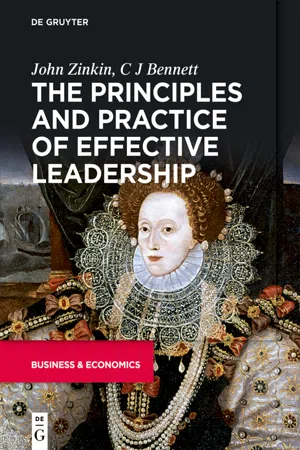
The Principles and Practice of Effective Leadership
John Zinkin, Christopher Bennett
- 366 Seiten
- English
- ePUB (handyfreundlich)
- Über iOS und Android verfügbar
The Principles and Practice of Effective Leadership
John Zinkin, Christopher Bennett
Über dieses Buch
This thought-provoking and timely book asserts that the dichotomy between leaders and managers described in much business literature fails to recognize how the two roles overlap. The book discusses techniques for senior executives based on history and neuroscience to enhance their "managerial leadership" in different environments. The ethical dilemmas of directors and executives are explored, with lessons from both leadership failures and successes.
The Principles and Practice of Effective Leadership redefines "leadership" as a morally neutral activity, reflecting the impact of strategic, cultural and operational contexts on a leader's effectiveness. The authors suggest there are universal but morally neutral techniques for effective leadership that depend on the context in which they are practiced. In Part 1, the careers and personalities of historical figures including Elizabeth Tudor, Napoleon, and Atatürk are examined. Part 2 deliberates on why leadership cannot be separated from effective management and concludes that leadership is managerial, and best encapsulated in the concept of "wayfinding." In Part 3, the authors discuss the techniques "wayfinders" can learn to be both effective and ethical, using a simple and practical framework.
This insightful book is essential reading for professionals, coaches, consultants, and academics interested in techniques and ethics of leadership and executive education.
Häufig gestellte Fragen
Information
Part 1: Lessons from History
Chapter 1 Leadership is Morally Neutral
Leaders are individuals who exercise authority and exert power. They get other people to go along, to follow. Inspiration is part of the appeal to others, but, as Freud insisted, so are fear, coercion, and conformity. To pretend leaders are not power wielders – a pretence which Barbara Kellerman argued was embraced by a ‘‘tacit alliance’’ among theoreticians, practitioners, researchers, educators, consultants, and trainers – was to ‘‘whistle in the dark’’ … Freud, not Carlyle, speaks to our contemporary awareness of … the ‘‘dark side’’ of leadership.1[Emphases ours]
- Confusing: For most people, “leader” refers to “any individual who uses power, authority and influence to get others to go along.”3 Hitler, Stalin, and Mao are commonly called “leaders” and not “power wielders.”
- Misleading: The distinction is false because:Leadership can be considered the exercise of influence, or a power relation, or an instrument of goal achievement, or a differentiated role … Those definitions are value-free and there is no good reason to distinguish “leaders” and “power-wielders”; to compare them is not to compare apples and oranges, but apples and apples.4
- Barrier to understanding: “We need to learn about good leadership by studying both what makes good leaders and what makes bad leaders so that we can avoid their mistakes …”5
Historically, political theorists have been far more interested in the question of how to control the proclivities of bad leaders than in the question of how to promote the virtues of good ones. Influenced by religious traditions that focused on good and evil, and often personally scarred by war and disorder, the best political thinkers have had a rather jaundiced view of human nature.6
Advice from the Ancients
He who rules by virtue is like the polestar, which remains unmoving in its mansion while all the others revolve respectfully around it.7
Approach them with dignity and they will be respectful. Be yourself a good son and a kind father and they will be loyal. Raise the good and train the incompetent, and they will be zealous.8
A leader is best when people barely know he exists, not so good when people obey and acclaim him, worst when they despise him. But of a good leader, who talks little, when his work is done, his aim fulfilled, they will say, “We did this ourselves.”9
| Leadership Context | Aspect of the Soul Involved | Driving Force | Virtues Needed |
|---|---|---|---|
| Philosopher Kings | Logos (Reason) | Philosophy: Love of learning | Wisdom: Knowledge of what is best for each part as well as the whole |
| Guardians | Thymos (Emotion) | Love of honor, victory, and reputation | Courage: Preservation of true beliefs about pain, pleasure, and fear |
| Harmony between philosopher kings, guardians, and producers | Eros (Material Desires) and Thymos working in harmony with Logos | Love of money and all the things it buys to satisfy appetites | Temperance: All agree to follow the better part over the interest of the worse part |
| The entire soul follows the philosophic part, with each doing its own part and enjoying its own pleasures | Each of the three groups working on achieving their own ends, without meddling | Subordination to Logos: All parts doing their own work and not overthrowing Logos | Justice: The power of each part doing its own specialized work |
| Type of Leader | Dominant Soul Part | Dominant Virtues | Ultimate Purpose |
|---|---|---|---|
| Philosopher | Logos (Reason) | Wisdom | Seeking truth/living a good and fine life |
| Timocratic | Thymos (Emotion) | Courage | Honor and victory |
| Oligarchic | Eros (Material Desires) with some Thymos | Temperance limited by courage | Wealth and making money |
| Democratic | Eros with limits on lawless desires | Limited temperance | Freedom with few limits |
| Tyrant | Eros without limits on lawless desires | None | Power and satisfying lusts |
Inhaltsverzeichnis
- Title Page
- Copyright
- Contents
- Introduction
- Part 1: Lessons from History
- Part 2: Leadership is Managerial
- Part 3: “Leadership Techniques”
- Index